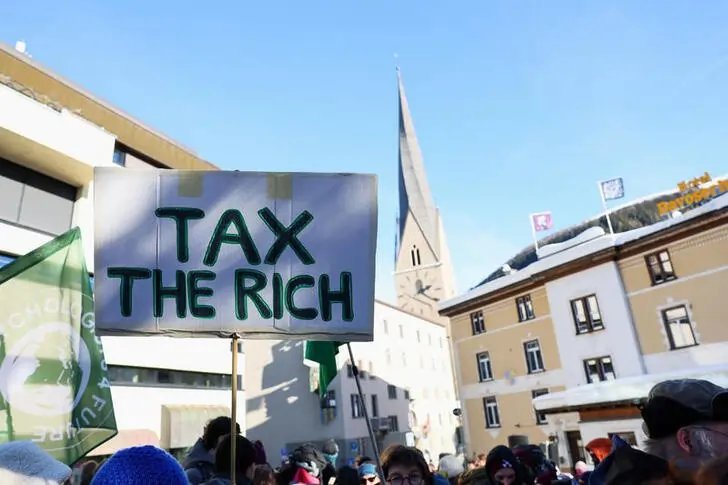As Davos crowd gathers, governments urged to rein in ‘billionaire class’
Published by Jessica Weisman-Pitts
Posted on January 15, 2024
3 min readLast updated: January 31, 2026

Published by Jessica Weisman-Pitts
Posted on January 15, 2024
3 min readLast updated: January 31, 2026

By Mark John
(Reuters) – The combined fortunes of the world’s five richest men have more than doubled to $869 billion since 2020 while five billion people have been made poorer, anti-poverty group Oxfam said.
An Oxfam report, which comes as business elites gather this week for the annual World Economic Forum (WEF) meeting in Davos, found that a billionaire is now either running, or is the main shareholder of, 7 out of 10 of the world’s biggest companies.
Oxfam called on Monday for governments to rein in corporate power by breaking up monopolies; instituting taxes on excess profit and wealth; and promoting alternatives to shareholder control such as forms of employee ownership.
It estimated that 148 top corporations made $1.8 trillion in profits, 52 percent up on 3-year average, allowing hefty pay-outs to shareholders even as millions of workers faced a cost of living crisis as inflation led to wage cuts in real terms.
“This inequality is no accident; the billionaire class is ensuring corporations deliver more wealth to them at the expense of everyone else,” said Oxfam International interim Executive Director Amitabh Behar.
The Davos events were launched to champion “stakeholder capitalism”, which the WEF says defines a corporation as being not just about maximising profits but fulfilling “human and societal aspirations as part of the broader social system”.
Oxfam said its report, based on data sources ranging from the International Labour Organization and World Bank to the Forbes annual rich list, showed such aspirations were far from being fulfilled.
“What we know for sure is that today’s extreme system of shareholder capitalism, which puts ever-increasing returns to rich shareholders above all other objectives, is driving inequality,” said Max Lawson, its Head of Inequality Policy.
The inflation-adjusted surge in wealth of the top five billionaires was driven by strong gains in the assets of Tesla CEO Elon Musk, LVMH chief Bernard Arnault, Amazon’s Jeff Bezos, Oracle co-founder Larry Ellison and investor Warren Buffett.
Meanwhile nearly 800 million workers saw their wages over the past two years fail to keep up with inflation, resulting on average in the equivalent of 25 days of lost annual income per worker, according to Oxfam’s analysis.
Of the world’s 1,600 largest corporations, just 0.4% of them have publicly committed to paying workers a living wage and to supporting a living wage in their value chains, the study found.
(Writing and reporting by Mark John; Editing by Alexander Smith)
Income inequality refers to the uneven distribution of income within a population, where a small percentage of people hold a significant portion of wealth, leading to disparities in living standards.
Shareholder capitalism is an economic system where the primary goal of a corporation is to maximize shareholder value, often at the expense of other stakeholders like employees and customers.
A cost of living crisis occurs when the prices of essential goods and services rise significantly, making it difficult for individuals and families to afford basic necessities.
Wealth management is a financial advisory service that combines investment management, financial planning, and other financial services to help clients grow and protect their wealth.
Explore more articles in the Top Stories category











